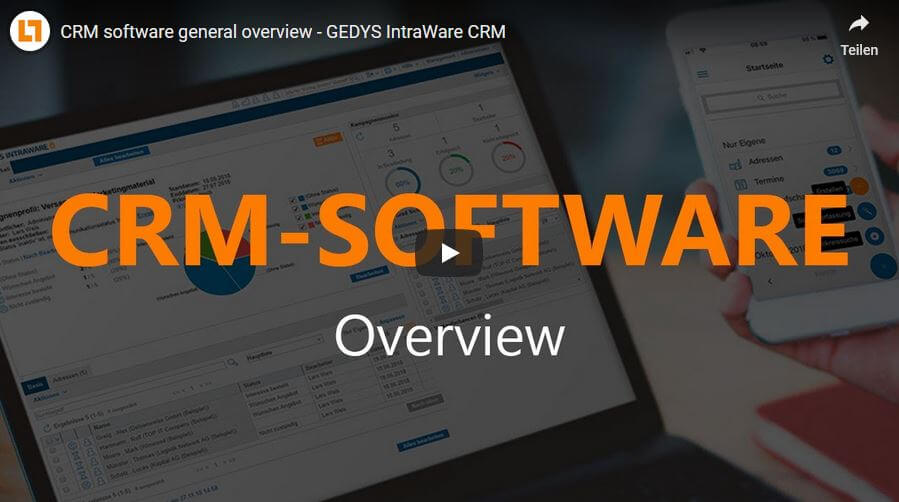B2B CRM versus B2C CRM
The needs and motivations of the respective customer groups vary greatly. This also affects the entire sales process.
Because marketing and sales work differently in the B2B than in the B2C, it is difficult to find a customer management system that meets both requirements. You can find out exactly how B2B CRM versus B2C CRM differs, what impact this has on the requirements for CRM software and what solutions are available in this article.
B2B-CRM versus B2C-CRM – these are the differences
Some features clearly show the differences between B2B-CRM vs. B2C-CRM:
- The number of contacts and the number of leads is significantly higher in the B2C than in the B2B business.
- The time for sale in the B2C can vary from days to months, but spontaneous purchases are also possible. B2B, on the other hand, has a period of months to years to sell.
- The number of people involved in the decision-making process is greater in the B2B business, so that coordination with colleagues is inevitable and spontaneous purchases do not happen – in the B2C, individuals usually make the purchase decision.
- The number of sales in the business relationship between two companies is significantly lower than that between the company and the end customer. For this, the prices for the products in the B2C are significantly lower than in the B2B business.
- B2B customers receive more advice and support from the seller, as opposed to end customers. This is due to the usually high complexity of the products sold.
- B2B customers also receive more customized products to satisfy their specific needs and needs. For private individuals on the B2C market, the goods are usually uniform and serve to satisfy a special need.
- The duration of the relationship between two B2B business partners is thus significantly longer than between companies and private individuals.
B2B CRM versus B2C CRM
Requirements for CRM software
Due to the different characteristics of the markets, the requirements for CRM software also differ.
Requirements – B2B-CRM:
- CRM should be focused on the long-term management of potential customers: for each individual customer, the detailed customer history must be available for all employees who have contact with the customer for a long time, because the purchase decision is made by impacton of the diverse interactions with the company.
- The relationships of all persons involved in the decision-making process must be transparent
- The monitoring of opportunities over long periods of time must be simple and as automated as possible
- Lead qualification is often carried out via several attempts (telephone calls, searches) and must be documentable quickly
- Enterprise software e.g. ERP systems must be easily integrated into CRM through interfaces to avoid duplication of data maintenance
- Mobile access via tablets and smartphones should be possible so that the field service can prepare for conversations on the go and capture new insights in a timely manner (keyword: speech recognition)
Requirements – B2C-CRM:
- The software is more focused on short-term sales due to various marketing activities, so marketing automation and multi-campaign management play a major role
- A very large number of leads and contacts must be managed
- The focus is on campaigns for larger customer volumes and updating large amounts of data within the system
- The automation of special parts of the sales process plays an important role, e.g. mailings are to be sent frequently at short intervals to specific target group clusters
- A hierarchical structure of the CRM system (company unit – contact) is not needed because it would cause unnecessary steps in lead management
- The integration of online shops plays a decisive role
CRM solution for B2B and B2C
There are many companies that operate simultaneously in the b2B and B2C sectors, and which poses major challenges in finding a suitable solution. Our solution GEDYS IntraWare CRM covers the requirements of B2B and B2C in equal measure due to its unique integration capability (e.g. interfaces to ERP and online shop systems, Outlook, Notes, MS Office) and the flexibly usable modules:
CRM in Sales
A CRM in sales significantly relieves your team
With GEDYS IntraWare CRM in sales, you manage your entire sales process and make your sales more successful. With leads and promising opportunities for your pipeline and forecast ingescent views, your team is more productive and has more time for customers. That will inspire them.
CRM in Marketing
From lead to favorite customer
- CRM supports, for example, the following questions:
- How many leads came into the CRM system via the website?
- Which campaigns have been successful?
- What references and materials are available for distribution?
- How many participants were at the event, the training, the fair, etc.?
CRM for Service & IT
Loyal customers will recommend you
- CRM supports, for example, the following questions:
- Which tickets are to be planned?
- Which employee has the necessary skills?
- Who is nearby with the customer?
- Who is available when?
- What about the sales goals?
Mobile CRM App
Making your day-to-day work productive on business trips
- Access to all customer data and activities for smartphones and tablets
- 360° overview: electronic customer file
- Caller Detection (on iOS)
- Orbit Search & Create Route Plan
- Create opportunities
- Create Phone Notes & Visit Reports
- Create projects
- Create service documents

